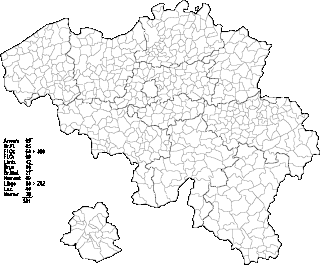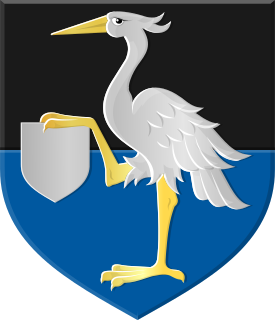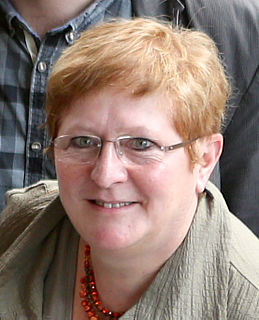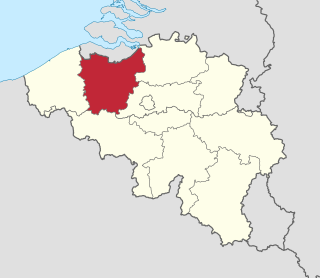
Flanders is the Dutch-speaking northern portion of Belgium and one of the communities, regions and language areas of Belgium. However, there are several overlapping definitions, including ones related to culture, language, politics, and history, and sometimes involving neighbouring countries. The demonym associated with Flanders is Fleming, while the corresponding adjective is Flemish. The official capital of Flanders is the City of Brussels, although the Brussels-Capital Region has an independent regional government. The government of Flanders only oversees the community aspects of Flanders life in Brussels, such as Flemish culture and education.

Belgium comprises 581 municipalities, 300 of them grouped into five provinces in Flanders and 262 others in five provinces in Wallonia, while the remaining 19 are in the Brussels Capital Region, which is not divided in provinces. In most cases, the municipalities are the smallest administrative subdivisions of Belgium, but in municipalities with more than 100,000 inhabitants, on the initiative of the local council, sub-municipal administrative entities with elected councils may be created. As such, only Antwerp, having over 500,000 inhabitants, became subdivided into nine districts. The Belgian arrondissements, an administrative level between province and municipality, or the lowest judicial level, are in English sometimes called districts as well.

Vlaams Blok was the name of a Belgian far-right and secessionist political party with an anti-immigration platform. Its ideologies embraced Flemish nationalism, calling for the independence of Flanders. The party originated from split within the Volksunie (VU) party after the right-wing separatist and national conservative wing became disgruntled with the compromise of accepting Belgian federalism over Flemish interests, and what they saw as the VU's move to the left. The former VU members created the Flemish National Party (VNP) and the Flemish People's Party (VVP) which formed an electoral alliance called Vlaams Blok in 1978, before merging to create Vlaams Blok as a political party in 1979. Vlaams Blok was the most notable militant right wing of the Flemish movement and its track record in the Flemish and Belgian parliament elections was strong, making it one of the most successful nationalist parties in Western Europe and it ultimately surpassed the People's Union in support. The party initially focused solely on the issues of Flemish autonomy and political freedom, which remained its core philosophy, but subsequently gained wider public support through broadening its campaigns to include immigration and law-and-order themes.

The Flemish Parliament constitutes the legislative power in Flanders for matters which fall within the competence of Flanders, both as a geographic region and as a cultural community of Belgium.

The Parliament of Wallonia is the legislative body of Wallonia, one of the three self-governing regions of Belgium. The parliament building, the former Hospice Saint-Gilles, is situated in Namur, the capital of Wallonia, at the symbolic confluence of the Meuse and the Sambre, the two main rivers of the most inhabited parts of Wallonia, the Sillon industriel. On the other side of the Meuse, facing the Parliament, is the Élysette, the seat of the Government of Wallonia.
Regional elections were held in Belgium, to choose representatives in the regional councils of Flanders, Wallonia, Brussels and the German-speaking Community on 13 June 1999. The regional elections were held on the same day as the European elections and the federal elections.
Vlaams Belang is a Flemish nationalist, right-wing populist political party in the Flemish Region and Brussels Capital Region of Belgium.
Flemish Sign Language is a deaf sign language of Belgium. It is closely related to French Belgian Sign Language, but they are now generally recognized as distinct languages. VGT is estimated to include around 6,000 sign-language users.

The Belgian provincial, municipal and district elections of 2006 took place on Sunday 8 October 2006. The electors have elected the municipal councillors of 589 cities and towns as well as the ten provincial councils. The voters in the town of Antwerp have also been able to vote for the city's district councils. In seven Flemish municipalities with a special language statute and in the Walloon municipality of Comines-Warneton the aldermen and the members of the OCMW/CPAS council have also been directly elected.

Geert Albert Bourgeois is a Belgian politician of the New Flemish Alliance (N-VA), which he founded in 2001, who is currently serving as a Member of the European Parliament since 2019. He previously served as the Minister-President of Flanders from 2014 to 2019. Prior to this, he was a member of the federal Chamber of Representatives for the People's Union from 1995 to 2001, and then for the N-VA from 2001 to 2004. He has been involved in local and regional politics in Flanders since 1976.

The Flemish Heraldic Council advises the Flemish Government on all matters relating to heraldry. The Council was created on 11 April 1984, as the successor to the Subcommittee for Heraldry or Subcommissie Heraldiek, established in 1978. Its prime task was to supervise the granting of a coat of arms and a flag to all municipalities of the Flemish Region. Following the reorganization of the Belgian provinces, the council's field of action was extended to provincial arms and flags in 1994. Since 2000, the Council has likewise advised the Flemish Government on grants of arms to Flemish individuals and corporations. In the meantime, more than 200 of such grants have received official sanction. Grants of arms by the Flemish Government are published in the Belgian official journal.
Regional elections were held in Belgium on 7 June 2009 to choose representatives in the regional parliaments of Flanders, Wallonia, Brussels and the German-speaking Community of Belgium. These elections were held on the same day as the European elections.

Maria Bertha Charlotte (Mieke) Vogels Belgian politician from Flanders in the environmentalist party Groen!.
Federal elections were held in Belgium on 25 May 2014. All 150 members of the Chamber of Representatives were elected, whereas the Senate was no longer directly elected following the 2011–2012 state reform. These were the first elections held under King Philippe's reign.
Regional elections were held in Belgium on 25 May 2014 to choose representatives for the Flemish Parliament, Walloon Parliament, Brussels Parliament and the Parliament of the German-speaking Community. These elections were held on the same day as the 2014 European elections as well as the 2014 Belgian federal election.

The 2019 Belgian regional elections took place on Sunday 26 May, the same day as the 2019 European Parliament election as well as the Belgian federal election.

Limburg is a parliamentary constituency in Belgium used to elect members of the Flemish Parliament since 2004. It corresponds to the province of Limburg.

East Flanders is a parliamentary constituency in Belgium used to elect members of the Flemish Parliament since 2004. It corresponds to the province of East Flanders.

Flemish Brabant is a parliamentary constituency in Belgium used to elect members of the Flemish Parliament since 2004. It corresponds to the province of Flemish Brabant.

West Flanders is a parliamentary constituency in Belgium used to elect members of the Flemish Parliament since 2004. It corresponds to the province of West Flanders.














